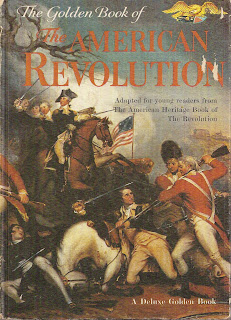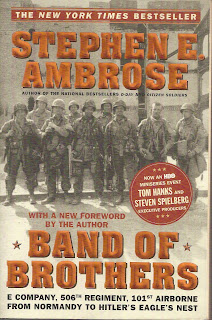"History is about high achievement, glorious works of art, music, architecture, literature, philosophy, science and medicine - not just politics and the military - as the best of politicians and generals have readily attested. History is about leadership, and the power of ideas. History is about change, because the world has never not been changing, indeed because life itself is change ... History is the course of human events. And it must therefore be, if truthful, about failure, injustice, struggle, suffering, disappointment, and the humdrum. History demonstrates often in brutal fashion the evils of enforced ignorance and demagoguery. History is a source of strength, a constant reminder of the courage of others in times more trying and painful than our own."
- David McCullough's "The Course of Human Events" (2003)
Most of my Facebook and Blogger friends have seen my posts about history. Whether it's talking about the latest historical book or documentary that I've watched, or noting the anniversary of an important historical event, or even posting about a major historical individual on their birthday, I love posting about history. A few people have given me positive feedback on these historical posts.
But I have never, as yet, talked publicly about how I got interested in history. At the risk of boring my readers, I will now share some of the story about how I acquired my passion for history.
Reading an illustrated children's book about the American Revolution
It began for me at a very young age. I found history an interesting subject in school, but I also did some reading about it on my own time. I read an illustrated children's book about the American Revolution, which got me interested in that period. I liked a number of historical movies I'd seen, but I had not really become a history buff. (That came later.)
The influence of my paternal grandfather upon my interest in World War II
My buffdom really began as I entered high school. It was encouraged by my paternal grandfather, who introduced me to many of the great Hollywood movies about World War II, such as "Patton" and "Midway." When I was at their house, I would watch History Channel programs about World War II, and eventually, I got into reading about the subject.
Reading Stephen Ambrose's book "Band of Brothers" (which further developed this interest)
One of the most important books I read was Stephen Ambrose's "Band of Brothers," on which the HBO miniseries of the same name is based. I have not seen the series, because practicing my religious beliefs would not permit me to watch something with that rating. But I was greatly captivated by the book, and it was important in forming my great interest in World War II.
The influence of Ken Burns' miniseries "The Civil War," which made me a Civil War buff
My dad also introduced me to Ken Burns' miniseries "The Civil War," which not only introduced me to the classics of historical documentary, but also ignited a lifelong interest in the Civil War. While I had been interested in this topic as a youth, I had not been familiar with the names of many major players and battles, like I had been with the American Revolution. But now, I knew many of those details for the Civil War as well.
High school classes in history, and college classes in history (of which I actually took five)
I greatly enjoyed my world history class in high school, which often included discussions about controversial topics in history, and I thought about majoring in the subject when I attended college. I took a number of college history classes, including a two-semester American history course and a three-semester Western Civilization course. But I did not receive the greatest grades in them, getting a number of "C's," and I discovered that the kinds of reading and writing that these classes required were not very fun for me. Thus, I decided not to major in history. I did, however, learn a great deal that I considered useful, and continued my lifelong interest in the more fun parts of history - namely, books, movies, and documentaries.
Watching "The World at War," the definitive television history of World War II
One of the great documentaries I feel to mention here is the British miniseries "The World at War." There have been a lot of great documentaries about World War II, but the most epic of them is probably this British series from the 1970's (some 23 hours long). Though it makes excellent use of period newsreels and combat footage, its greatest strength may be in the interviews it takes, most of which could not be done today. They interview not only regular soldiers, sailors, and civilians; but also generals, admirals, and politicians. My research convinced me that this was probably the best series ever made about World War II.
Watching "The Great War" (a similar series about World War One), and CNN's "The Cold War"
I later watched a similar series about World War One entitled "The Great War" which was made by the BBC and narrated by Michael Redgrave. This series was made in 1964 (only fifty years after the war that it depicted), and so was able to interview eyewitnesses who are no longer with us, and therefore could never be interviewed again (at least not in mortality). In 17 hours of television, it weaved together the real footage with the eyewitness interviews; and thus may be the best television series that will ever be made about the First World War. (Here's a link to more information if you're interested.) I also watched CNN's "The Cold War," which was a sort of sequel to "The World at War." It is the definitive television history of the Cold War, and thus ignited a long-standing interest on that subject.
Reading some of the great political books from history
I also got interested in a number of historical books that others would not find so interesting - namely, the classics of political philosophy. I have another post which talks more in depth about that, but suffice it to say here that I got interested in these aspects of history as well.
Historical documentaries of all kinds, including those about famous historical statesmen
My interest in these fascinating documentaries continued after graduation, and they ranged from documentary histories of particular countries, to biographies of historical individuals. It was my aunt that got me interested in documentaries about historical statesmen (including presidents), as she introduced me to documentaries about Benjamin Franklin, Thomas Jefferson, and Abraham Lincoln. I eventually started to watch other statesmen biographies (particularly those available on Netflix), and as my brother-in-law Tim predicted, I soon amassed a large collection of documentaries about famous governmental leaders. I have a list of favorite documentaries which goes into more detail, but suffice it to say here that these documentaries were one of my passions.
The Personal Memoirs of Ulysses S. Grant (which deserves some special mention here)
And one great book is also deserving of note, which are the Personal Memoirs of Ulysses S. Grant. I have a blog post that goes into more detail about it, but suffice it to say here that I was fascinated by the dramatic story of Grant's life, and would recommend this book to other people.
There are many more books and movies on my list, and history is still fun for me
And I plan to learn more about history throughout my life. I don't want to take any more college history classes, but there are still many historical books and movies on my list, and I have no doubt that doing these things will continue to be fun.
Update: Classical and Biblical history
I have gotten into classical and Biblical history since first publishing this, by reading one textbook history each for Ancient Greece, Ancient Rome, Ancient Egypt, and the Ancient Near East. I have also endeavored to learn Hebrew and Greek as well, so that I might read the Old and New Testaments in the original one day. (More about that here.) So I can actually say that I'm something of an amateur classicist and amateur Biblical scholar now (emphasis on the "amateur" for both). These all seem (at least somewhat) relevant to history.
Disclosure: I am an Amazon affiliate marketer, and can sometimes make money when you buy the product using the link(s) above.
If you liked this post, you might also like:
Falling in love with Classics
Why I am learning Ancient Greek
Learning the basics of Ancient Greek from a book
How to write a killer history paper
Some thoughts about history education
Why World War II continues to fascinate so many
Part of a series about
My own experiences
My passion for history
Note: These posts do not have to be read in any particular order. Since time periods overlap, there isn’t much chronological order to observe here.
History education
Classical education
Biblical education
Philosophy education
Linguistics education
Foreign language education
Business education
Economics education
Math education
Finance education
Marketing research education
Classical education
Biblical education
Philosophy education
Linguistics education
Foreign language education
Business education
Economics education
Math education
Finance education
Marketing research education










No comments:
Post a Comment